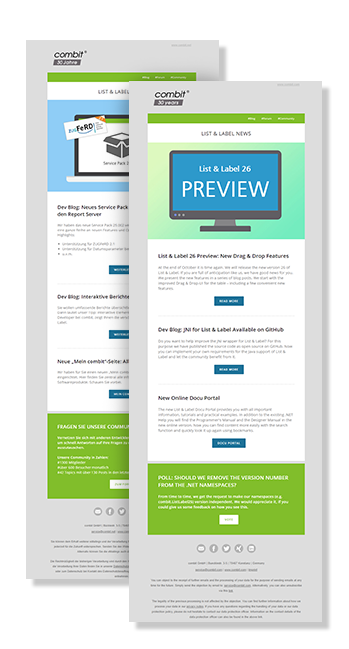Service Pack 31.001 for List & Label introduces official support for ZUGFeRD 2.4 PDF exports, adds nested tables and enhanced contrast optimization to cross-platform text rendering, improves performance and stability across designers and exports, and delivers multiple security updates for Web Components and third-party libraries.
If you’ve connected large and complex data sources in the Web Report Designer, you’re probably familiar with the problem: the DataTree seems to load forever with complex data structures.
With List & Label 31, that’s a thing of the past. The technical foundation of the DataTree has been completely overhauled. “react-arborist” replaces “rc-tree” – and the result is a significantly smoother reporting experience in the browser.
With the release of version 31 of List & Label in October 2025, full support for the current ZUGFeRD/Factur-X standard 2.3 will be available.
The upcoming version 2.4 – already announced for Q4/2025 – will also be supported via service packs for List & Label 31.
This makes List & Label a future-proof solution for digital, legally compliant e-invoicing across Germany and Europe.
Since version 30, the Web Report Designer supports drilldowns. This allows you to implement interactive reports entirely in the browser – including navigation between different detail levels. This feature was previously only available in the desktop designer.
The latest service pack 30.003 for List & Label adds Windows 11 25H2 support, introduces a new datastructure tree component in the Web Report Designer, improves performance for large projects, and increases the maximum number of print passes to 1000.
AI is everywhere—and now it’s in your report designer, too. With a quite simple AI$() designer function, you can embed the power of OpenAI or other LLMs … Read more
From the idyllic Lake Constance to the capital on the Spree: this year, we had our own booth at the WeAreDevelopers World Congress – and not only did we have a good mood in our luggage, but also our “next big thing”: List & Label Cross Platform.
In the world of server-based reporting, there are often challenges in connection with different time zones. The complexity increases in particular when the database server, the … Read more
With the new “Apply immediately” property for report parameters, you no longer have to click “Refresh” manually every time: as soon as you change a parameter with this option enabled, List & Label automatically re-renders your report. It saves you time, streamlines your workflow, and delivers an intuitive user experience—both on desktop and on the web.
The latest service pack 30.002 for List & Label brings form controls to the Web Report Designer and Web Report Viewer, adds RAD Studio 12.3 support, and expands flexibility for OData sources in the Report Server.
A very popular wish from our Idea Place is finally fulfilled in version 30 – SVG files are optionally output as vectors.











